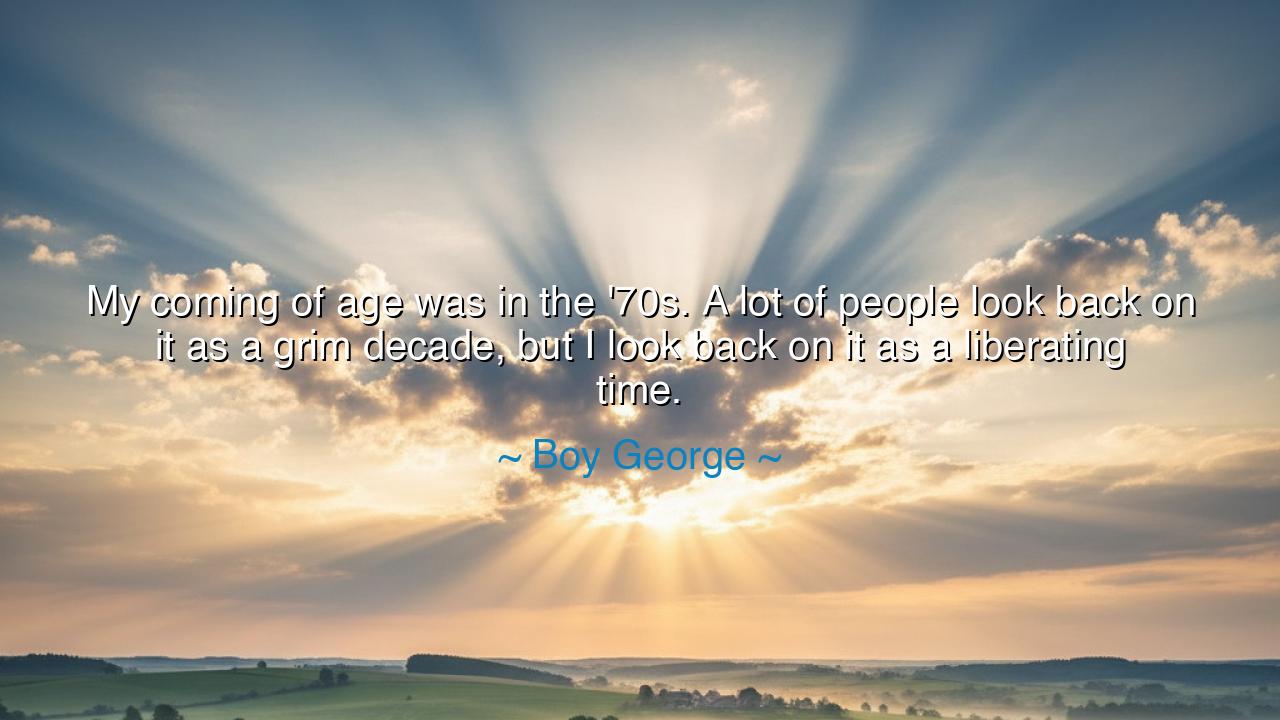
My coming of age was in the '70s. A lot of people look back on it
My coming of age was in the '70s. A lot of people look back on it as a grim decade, but I look back on it as a liberating time.






“My coming of age was in the '70s. A lot of people look back on it as a grim decade, but I look back on it as a liberating time.” So spoke Boy George, a spirit of flamboyance and truth, who rose from the twilight of conformity into the dawn of self-expression. His words are more than the memory of a decade—they are a hymn to transformation. For the 1970s, though clothed in turmoil, bore within it the seed of liberation, not through peace, but through struggle; not through perfection, but through rebellion. It was a time when the old order cracked and the young, restless hearts danced upon its fragments, unafraid to be seen as they truly were.
In the eyes of the world, the '70s were scarred by doubt: economies faltered, wars left shadows, and the bright dreams of the '60s seemed to fade into disillusionment. Yet to those with ears attuned to the deeper music of the age, it was an era when freedom began to breathe differently. The boundaries of identity, art, and love were challenged; the walls between the public self and the private soul began to crumble. To be alive then was to stand at the crossroads of old morality and new expression. Boy George, like many of his generation, walked through that gateway not with fear, but with flamboyance—with painted face and fearless heart.
There is an ancient rhythm to this: that out of darkness, light is born. The '70s, grim to some, were to others a crucible of awakening. When the colors of culture seemed to dim, artists made their own brightness. When voices were told to be silent, they sang louder. When gender, love, and art were confined to narrow definitions, a generation said, “No more.” The liberation that Boy George remembers was not given—it was claimed. Just as Prometheus stole fire from the gods, so did the youth of that time steal back the right to define themselves.
Consider the tale of David Bowie, another star who burned brilliantly in that same sky. He too was called strange, alien, even dangerous. Yet in his shimmering persona—Ziggy Stardust—he shattered illusions that had bound the human spirit for centuries. He showed that identity was not a prison but a canvas, that to change one’s form was not deceit but art. Bowie and Boy George were kindred lights, forging paths through misunderstanding and mockery, their mere existence a defiance of convention. They taught the world that to live authentically is to live courageously, and that liberation often wears the mask of scandal before it is crowned with glory.
Let it be known, then, that a grim age does not mean a hopeless one. The wise know that every age bears its own chains and its own keys. Those who call an era bleak often look only at its surface—the noise, the conflict, the uncertainty. But beneath that, there are always hearts in rebellion, spirits that rise against the grayness to proclaim, “I will be myself.” The '70s, as Boy George reminds us, were liberating because they gave birth to self-expression as a virtue, not a sin. What others saw as chaos, the bold saw as creation.
From this we must learn: liberation does not depend on the times, but on the courage of souls who live within them. The world may darken, the powers may seek control, but no decade, no empire, can chain the inner revolution of those who dare to live truthfully. As Boy George emerged from the streets of London clad in colors and confidence, so too must each of us emerge from the dull uniformity of our own fears. Every generation must find its own '70s—a moment when it breaks the mirror of expectation and sees itself anew.
So, my child of the modern age, hear this: do not fear the grimness of your time. The liberation you seek will not arrive dressed in peace and comfort. It will come in the roar of rebellion, in the trembling of the heart that chooses honesty over acceptance. Let the world call your time bleak if it must; be as Boy George was, and look back upon it as the decade of your becoming. For the truly free do not wait for their era to bless them—they bless their era by daring to live.
Practical teaching: Seek the light that shines even in dark ages. Express yourself without apology—through art, through voice, through love. When others call your time grim, remember: the greatest liberation often rises from the ashes of despair. Be unafraid to be vivid, unafraid to be seen. For the ages belong not to those who hide, but to those who dare to create themselves anew.






AAdministratorAdministrator
Welcome, honored guests. Please leave a comment, we will respond soon